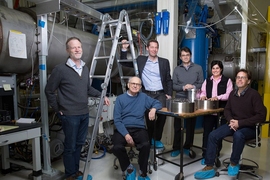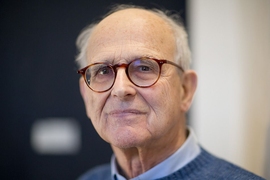The following email was sent today to the MIT community by President L. Rafael Reif.
To the members of the MIT community,
At about 10:30 this morning in Washington, D.C., MIT, Caltech and the National Science Foundation (NSF) will make a historic announcement in physics: the first direct detection of gravitational waves, a disturbance of space-time that Albert Einstein predicted a century ago.
You may want to watch the announcement live now. Following the NSF event, you can watch our on-campus announcement event.
You can read an overview of the discovery here as well as an interview with MIT Professor Emeritus Rainer Weiss PhD '62, instigator and a leader of the Laser Interferometer Gravitational-Wave Observatory (LIGO) effort.
The beauty and power of basic science
I do not typically write to you to celebrate individual research achievements, no matter how impressive; our community produces important work all the time. But I urge you to reflect on today's announcement because it demonstrates, on a grand scale, why and how human beings pursue deep scientific questions – and why it matters.
Today's news encompasses at least two compelling stories.
First is the one the science tells: that with his theory of general relativity, Einstein correctly predicted the behavior of gravitational waves, space-time ripples that travel to us from places in the universe where gravity is immensely strong. Those rippling messages are imperceptibly faint; until now, they had defied direct observation. Because LIGO succeeded in detecting these faint messages – from two black holes that crashed together to form a still larger one – we have remarkable evidence that the system behaves exactly as Einstein foretold.
With even the most advanced telescopes that rely on light, we could not have seen this spectacular collision, because we expect black holes to emit no light at all. With LIGO's instrumentation, however, we now have the "ears" to hear it. Equipped with this new sense, the LIGO team encountered and recorded a fundamental truth about nature that no one ever has before. And their explorations with this new tool have only just begun. This is why human beings do science!
The second story is of human achievement. It begins with Einstein: an expansive human consciousness that could form a concept so far beyond the experimental capabilities of his day that inventing the tools to prove its validity took a hundred years.
That story extends to the scientific creativity and perseverance of Rai Weiss and his collaborators. Working for decades at the edge of what was technologically possible, against the odds Rai led a global collaboration to turn a brilliant thought experiment into a triumph of scientific discovery.
Important characters in that narrative include the dozens of outside scientists and NSF administrators who, also over decades, systematically assessed the merits of this ambitious project and determined the grand investment was worth it. The most recent chapter recounts the scrupulous care the LIGO team took in presenting these findings to the physics community. Through the sacred step-by-step process of careful analysis and peer-reviewed publication, they brought us the confidence to share this news – and they opened a frontier of exploration.
At a place like MIT, where so many are engaged in solving real-world problems, we sometimes justify our nation's investment in basic science by its practical byproducts. In this case, that appears nearly irrelevant. Yet immediately useful "results" are here, too: LIGO has been a strenuous training ground for thousands of undergraduates and hundreds of PhDs – two of them now members of our faculty.
What's more, the LIGO team's technological inventiveness and creative appropriation of tools from other fields produced instrumentation of unprecedented precision. As we know so well at MIT, human beings cannot resist the lure of a new tool. LIGO technology will surely be adapted and developed, "paying off" in ways no one can yet predict. It will be fun to see where this goes.
* * *
The discovery we celebrate today embodies the paradox of fundamental science: that it is painstaking, rigorous and slow – and electrifying, revolutionary and catalytic. Without basic science, our best guess never gets any better, and "innovation" is tinkering around the edges. With the advance of basic science, society advances, too.
I am proud and grateful to belong to a community so well equipped to appreciate the beauty and meaning of this achievement – and primed to unlock its opportunities.
In wonder and admiration,
L. Rafael Reif









